
We speak to civil rights lawyer Ben Crump about the ongoing epidemic of anti-Black police violence and impunity for law enforcement in the United States. Crump first comments on the sentencing of Brett Hankison, a former Louisville police officer who fired 10 bullets into Breonna Taylor’s home in 2020 during a botched raid, to 33 months in prison for use of excessive force. Although Hankison’s actions were “a violation of [Taylor’s] Fourth Amendment rights,” the Trump Justice Department had recommended only one day in prison for his sentencing. In court, “there was nobody advocating for Breonna,” says Crump.
We then discuss the announcement of no charges against the officers who assaulted William Anthony McNeil Jr., a Black man who was violently arrested and beaten during a traffic stop in Florida, as well as the death of 18-year-old Saniyah Cheatham in NYPD custody. Crump says, “For many minorities in America, it is a constant threat for us, especially Black people, this constant racial profiling.”
Finally, Crump continues to call for the public release of FBI files concerning the assassination of Malcolm X. If the government “wants to be transparent,” he says, referring to the release this year of files on the assassinations of John F. Kennedy and Martin Luther King Jr., “then they need to be consistent across the board.”
Transcript
AMY GOODMAN: This is Democracy Now!, democracynow.org, The War and Peace Report. I’m Amy Goodman.
In a closely watched decision, this week a federal judge in Kentucky sentenced the former Louisville police officer who blindly fired 10 bullets into Breonna Taylor’s home in 2020 during a botched raid. Brett Hankison was sentenced to 33 months in prison for using excessive force during the deadly no-knock police raid that killed Breonna Taylor in her own home. U.S. District Judge Rebecca Grady Jennings rejected the prosecutor’s recommendation to have Brett Hankison sentenced to just one day in prison, calling the effort “not appropriate.” Some of the bullets he fired penetrated the walls of a neighbor’s home, where a family was sleeping. Taylor was a Black 26-year-old emergency room technician whose killing sparked nationwide racial justice protests under the banner of “Black Lives Matter.”
Louisville Metro Police arrested four protesters who blocked traffic outside the federal court where Hankison was sentenced on Monday. Among those arrested was Bianca Austin, Breonna Taylor’s aunt. Taylor’s former boyfriend and her mother responded to the sentencing.
TAMIKA PALMER: I think the judge did the best she could with what she had to work with. There was no prosecution in there for us. There was no prosecution in there for Breonna.
BENJAMIN CRUMP: That part.
TAMIKA PALMER: So, I definitely, you know, I’m grateful for the judge for giving some time, because we could have walked away with nothing, according to what they recommended.
KENNETH WALKER: I’m grateful for the small piece of justice that we got. It’s definitely not what I was expecting. And Brett Hankison told me I was going to go to jail for the rest of my life. So I definitely feel some type of something to see him going for even if it’s a little time.
AMY GOODMAN: Breonna Taylor’s boyfriend and mother.
For more, we’re joined by Ben Crump, civil rights attorney. We want to ask you about a number of cases, from the reason you’re here in New York, the wake and funeral of an 18-year-old young woman in police custody, the beating of and the smashing of the window of a Black motorist in Jacksonville, Florida. But let’s begin with the sentencing of Brett Hankison, the former Louisville police officer who shot into Breonna Taylor’s home. Your response?
BENJAMIN CRUMP: Well, Amy Goodman, I think Breonna’s mother and boyfriend expressed it best when Tamika Palmer said there was no prosecution for Breonna in the courtroom. It was like a George Orwell Animal Farm courtroom scene, where the prosecutor was really the defense lawyer for Brett Hankison. They were advocating harder for Brett Hankison to be exonerated than his defense lawyers were, and it was just mind-boggling. And so, like Breonna’s mother Tamika Palmer said, there was nobody advocating for Breonna. I mean, they recommended he get one day in prison, and that was what he had been — served when he was arrested, Amy. So, they essentially wanted him to get no jail time for a jury, an all-white jury, finding that he had committed a felony.
And so, I mean, the judge, thank God for her. She even had to argue with the prosecutor that, you know, a violation of civil rights was a crime, because they were trying to say, “Well, we don’t even know if we ever would have prosecuted this case. You know, that was the last administration. The bullets didn’t hit anybody.” And she stopped him, and she said, “No, no.” She said, “Civil rights violations are defined as crimes in America. They shot those 10 shots. It was a violation of her Fourth Amendment rights.” Breonna Taylor, while he was shooting at her front door, was not allowed to leave her premises, and that constitutes seizure, Fourth Amendment violation against the unlawful search and seizure. And so, it was like unbelievable, Amy. And as her boyfriend Kenny Walker said, you know, at least he got some jail time, because they wanted him to get no jail time for killing this Black woman.
AMY GOODMAN: Just to be clear, it was another officer named Myles Cosgrove who was determined to have fired the shot that killed Breonna. He was fired but faced no legal consequences?
BENJAMIN CRUMP: Yes, because the court determined that Black people don’t have a right to the Second Amendment, apparently, because when Kenny Walker fired at who he thought was breaking into their apartment at 1:00 in the morning, who they didn’t know who was coming through the door, because these no-knock warrants are inherently dangerous, and when he fired the shot back, one shot, letting the intruders know that he had a gun, and so Myles Cosgrove and the other officers started shooting. And the court determined that they were justified in self-defense. And so, I mean, it’s almost as if they are telling Black people, “You all don’t have a right to the Second Amendment.”
AMY GOODMAN: This week in Florida, the Jacksonville Sheriff T.K. Waters said Monday none of the officers involved in the violent arrest and beating of a 22-year-old Black motorist named William Anthony McNeil Jr. will face criminal charges. Video of the beating has since gone viral. Jacksonville Sheriff’s Office deputies pulled McNeil over February 19th for driving without his headlights on, even though it was daytime and it wasn’t even raining. Cellphone video from his dashboard shows McNeil posing no threat to officers. As he’s questioned why — as he’s questioning why they’re pulling him over, an officer then breaks McNeil’s window and punches him in the face, before officers drag him from the car, throw him to the ground and begin pummeling him. Just a quick clip.
SHERIFF’S DEPUTY 1: Exit the vehicle now! Exit the vehicle! Show me your hands!
WILLIAM ANTHONY McNEIL JR.: Here. I’m here. What is your reason, sir?
SHERIFF’S DEPUTY 2: Step out! Step out!
WILLIAM ANTHONY McNEIL JR.: What is your reason?
SHERIFF’S DEPUTY 3: Step out now!
SHERIFF’S DEPUTY 2: All right, get on the ground!”
WILLIAM ANTHONY McNEIL JR.: No! No, don’t! Don’t touch!
SHERIFF’S DEPUTY 2: Get on the ground!
AMY GOODMAN: McNeil says he suffered a chipped tooth that pierced his cheek, requiring stitches; a concussion; short-term memory loss. The Jacksonville NAACP called the video — said, “This troubling behavior from law enforcement highlights the very reasons why many African Americans, especially African American men, feel fear during traffic stops.” Ben Crump, you’re representing him. Can you talk about the video being released months after, and what you’re calling for?
BENJAMIN CRUMP: Absolutely, Amy. First of all, you know, this lie that they were stopping him for driving without his headlights on, even though it was in the broad daylight and it wasn’t inclement weather, is just a classic example of driving while Black. Many people don’t ever understand that. They don’t have to worry about that. But for many minorities in America, it is a constant threat for us, especially Black people, this constant racial profiling. And I have articulated that what happened with William McNeil Jr. was a 21st-century Rosa Parks moment, where Black Americans just get so fed up with having our constitutional rights and our civil rights and our humanity constantly disrespected and ignored.
And so, William McNeil, once he heard the police say that “I stopped you for not having your headlights on in broad daylight” — he asked him, “What did I — you stop me for?” and that was the response. And then he said, “I want to talk to your supervisor.” And because he dared ask, like any citizen have the right to do, Amy Goodman, for his supervisor, then you see this brutal assault on him, not only his car, but his person. They get him out of the car. He’s restrained. They’re punching him. They get him on the ground with handcuffs. Then they slam his head on the ground three — at least three times. It looked like it could have been many more. And there are four officers there, and nobody seems alarmed by this behavior, so you know it must be business as usual.
And so, he was afraid. And, you know, his family, after they arrested him and put him in jail for two days, took him to the hospital from the jail cell. And he just was afraid, because his mom and dad said they don’t want anything else to do with this. But, thank God, they finally got the courage to release this video months later. And everybody — everybody should have video cameras recording when the police have these interactions with them, because they did not tell the truth on their police reports. When you look at the video, it is contradicting what they said on the police report.
AMY GOODMAN: I can’t believe I’m asking you about yet another case. But here in New York, you were here this week. Family and community members gathered Tuesday for the wake to commemorate Saniyah Cheatham, an 18-year-old young Black woman from the Bronx who died in police custody earlier this month. City medical examiners ruled the teen’s death a suicide, but her family continues to demand justice and answers in what led to her death, after she was found hanging in a holding cell at the NYPD precinct in the Bronx on July 5th. Dr. Stephan Marshall, a National Action Network senior adviser, addressed the police during his remarks at her funeral.
REV. STEPHAN MARSHALL: Where the hell were you when Saniyah was actually begging for help? It is a disgrace. It is disgusting that this story has been told in a whisper.
AMY GOODMAN: Ben Crump, you’re representing a Saniyah’s family. What are you calling for?
BENJAMIN CRUMP: We’re calling for transparency, and we’re calling for accountability. When you’re having a mental health crisis, you should have the appropriate responses. NYPD in that Bronx jail had a camera that was facing the jail cell of Saniyah Lake [phon.] Cheatham the whole time. This 18-year-old teen was crying out for help. That’s what you do when you are suicidal. And the video is going to be shocking once it’s released, because you have this little girl who they — clearly, if they’re watching the video, is having a mental health crisis. And she’s telling them things, she’s screaming, and nobody does anything. And you see — it reminds me of George Floyd, when you say somebody certainly is going to intervene, somebody is definitely going to come and do something, and nobody does anything. The fact that you’re Black and you’re having a mental health crisis should not equal a death sentence for you. So, NYPD, you have to have this matter addressed. Where were you? Were you asleep at the wheel? Apparently, it seems you were.
AMY GOODMAN: Ben Crump, finally, in just two minutes, the Trump administration released over 240,000 pages of FBI records on Martin Luther King Jr., despite opposition from the King children, who said J. Edgar Hoover had a campaign against Dr. Martin Luther King. The Trump administration released this as so many calls were coming in for the release of the Epstein files. But you’ve been calling for, working with the Malcolm X family, the documents to be released in the assassination of the slain civil rights leader Malcolm X. Your thoughts? What you’re demanding now?
BENJAMIN CRUMP: Well, thank you so much, Amy, for acknowledging Malcolm X’s family plight for justice 60 years later. You know, Dr. King’s family said, “We don’t want you to release the video,” but they said, “No, no. For transparency, we’ve got to release it,” even though they’re not releasing Jeffrey Epstein’s files. And Malcolm X’s family is saying, “We want you to be transparent. We want you to release the files.” But they’re not doing it.
And I believe that unless there’s some motive that they have, they have been very selective in who they want to release files, who they don’t want to release files, Amy. I think a lot of it is deliberate and intentional, and none of it is good for our causes. If they want to be transparent, then they need to be consistent across the board. Release Malcolm X’s files. Release the Epstein’s file. Release everybody’s files, because we know Afeni Shakur — they just kept files on every significant Black person trying to discredit them. Release all the files, Trump administration, if you want to be transparent.
AMY GOODMAN: Ben Crump, I want to thank you so much for being with us, leading civil rights attorney in this country.

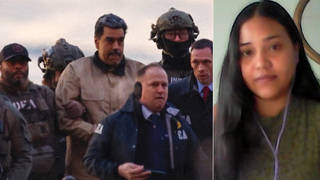
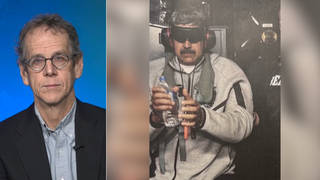


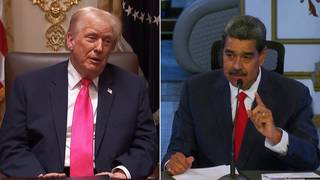
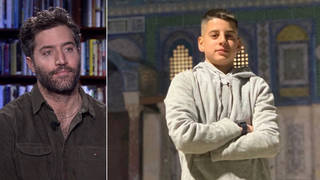


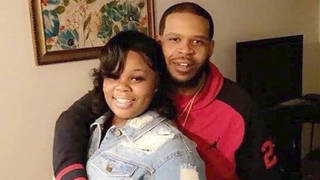

Media Options